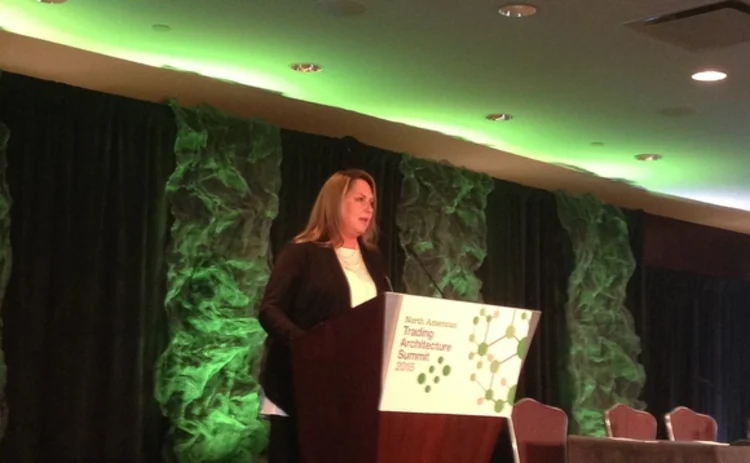NATAS 2015 Morning Keynote: Wells Fargo's Wiser on the Importance of Bringing in Millennials
Wells Fargo's Nancy Wiser laid out the four buckets where firms need to evolve in today's trading environment.

While delivering the morning keynote address at this year's North American Trading Architecture Summit, Nancy Wiser, COO and head of technology at Wells Fargo Funds Management, asked those in attendance to raise their hands if they were 34 years old or younger ─ only a smattering of hands went up.
"The thing to recognize, is that when we talk about millennials ─ and it's debatable whether that's 34 or 35 ─ the key is that by the year 2025, 75 percent of the workforce is going to be millennials. Think about that: In 10 years, you're likely to see a lot more hands in the air."
One of the great challenges that financial services firms are facing in the 21st century is the need to identify and secure financial technology talent.
Wiser noted that this generation has different values ─ "not bad, not good...just different" ─ such as wanting flexibility, freedom of choice, being team-oriented, and showing results versus putting in time. "These are the sorts of things that are going to drive millennials," she said.
This means that management teams both in business and in technology have to adapt and change the way that they operate.
[By] the year 2025, 75 percent of the workforce is going to be millennials. Think about that: In 10 years you're likely to see a lot more hands in the air. ─ Nancy Wiser, COO and head of technology, Wells Fargo Funds Management.
Tech Has the Advantage
"I would argue that technology has an advantage over other aspects of our businesses," Wiser said. "Historically, we've been more flexible. It's not unusual to have technologists work from home because a lot of technologists are 24 by 7. So time shifts and where they work is not as dramatic a change for technology. But that is where the change in culture needs to happen."
One of the great challenges that firms need to learn to overcome is how to develop skills in millennials if they aren't in the office sitting next to the boss as often as they would be if they were office based. Also, how do you identify and develop leaders for the next generation, Wiser asked.
"There are no right answers to these questions, but these are questions that you should be asking yourself and contemplating as more and more millennials enter the workforce," she said.
Capital markets firms will benefit from being adaptive and flexible, Wiser said, as opposed to forcing millennials into rigid corporate structures and operating models, which might lead to promising, young developers heading to pharma, healthcare, defense or Silicon Valley, rather than Wall Street.
The Three Other ‘Buckets'
In addition to the challenge of attracting millennials to financial IT, Wiser also laid out three other areas that firms need to focus in on.
First, when it comes to dealing with third-party service and technology providers, to mitigate the risk of lost information, Wiser stressed the need for more due diligence visits. While this might be easier for larger institutions like Wells Fargo than, say, a boutique brokerage firm, she also advocated developing detailed questionnaires specific to the company's needs.
Second, firms need to balance investing in cutting-edge new technologies versus protecting customer data.
"As technologists, many of you love to build stuff and do the cool stuff. The innovation gets technologists super excited," she said. The problem is that part of your job is also to be the safe keeper, to protect. You have to balance building the cool stuff against protecting your data and your customers' information."
Finally, people need to look at cyber security and information security as being two similar, but different hurdles.
"Historically, people used the term cyber security and information security interchangeably. I'm not so sure that they're interchangeable. Cyber security is very specific, while information security is much broader. The threat might not just be the hacker trying to get into your system; the threat might be an employee sitting next to you or a contractor."
Only users who have a paid subscription or are part of a corporate subscription are able to print or copy content.
To access these options, along with all other subscription benefits, please contact info@waterstechnology.com or view our subscription options here: http://subscriptions.waterstechnology.com/subscribe
You are currently unable to print this content. Please contact info@waterstechnology.com to find out more.
You are currently unable to copy this content. Please contact info@waterstechnology.com to find out more.
Copyright Infopro Digital Limited. All rights reserved.
You may share this content using our article tools. Printing this content is for the sole use of the Authorised User (named subscriber), as outlined in our terms and conditions - https://www.infopro-insight.com/terms-conditions/insight-subscriptions/
If you would like to purchase additional rights please email info@waterstechnology.com
Copyright Infopro Digital Limited. All rights reserved.
You may share this content using our article tools. Copying this content is for the sole use of the Authorised User (named subscriber), as outlined in our terms and conditions - https://www.infopro-insight.com/terms-conditions/insight-subscriptions/
If you would like to purchase additional rights please email info@waterstechnology.com
More on Emerging Technologies
Nasdaq reshuffles tech divisions post-Adenza
Adenza is now fully integrated into the exchange operator’s ecosystem, bringing opportunities for new business and a fresh perspective on how fintech fits into its strategy.
Liquidnet sees electronic future for gray bond trading
TP Icap’s gray market bond trading unit has more than doubled transactions in the first quarter of 2024.
Verafin launches genAI copilot for fincrime investigators
Features include document summarization and improved research tools.
Waters Wrap: Open source and storm clouds on the horizon
Regulators and politicians in America and Europe are increasingly concerned about AI—and, by extension, open-source development. Anthony says there are real reasons for concern.
Waters Wavelength Podcast: Broadridge’s Joseph Lo on GPTs
Joseph Lo, head of enterprise platforms at Broadridge, joins the podcast to discuss AI tools.
Man Group CTO eyes ‘significant impact’ for genAI across the fund
Man Group’s Gary Collier discussed the potential merits of and use cases for generative AI across the business at an event in London hosted by Bloomberg.
BNY Mellon deploys Nvidia DGX SuperPOD, identifies hundreds of AI use cases
BNY Mellon says it is the first bank to deploy Nvidia’s AI datacenter infrastructure, as it joins an increasing number of Wall Street firms that are embracing AI technologies.
This Week: Linedata acquires DreamQuark, Tradeweb, Rimes, Genesis, and more
A summary of some of the latest financial technology news.
Most read
- Chris Edmonds takes the reins at ICE Fixed Income and Data Services
- Deutsche Börse democratizes data with Marketplace offering
- Waters Wavelength Podcast: Broadridge’s Joseph Lo on GPTs








